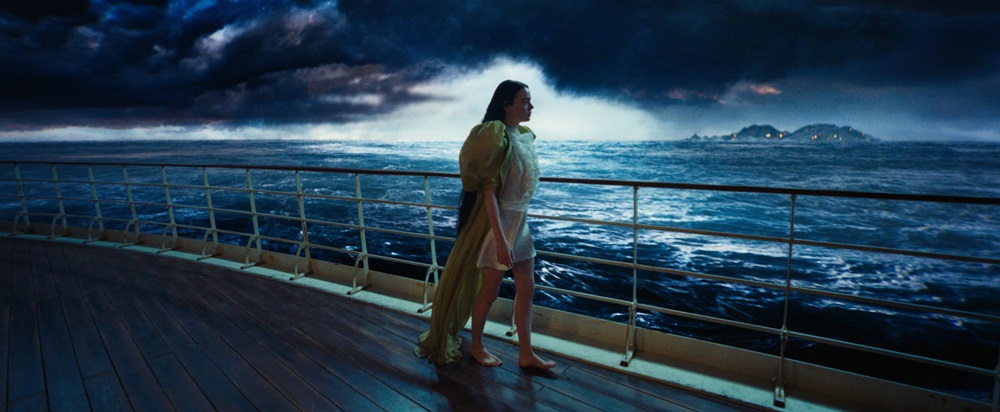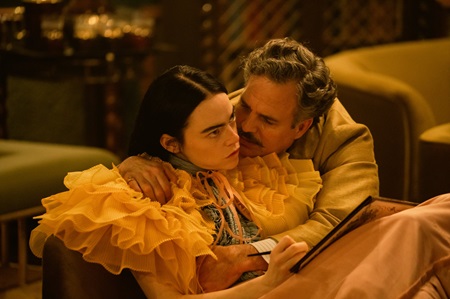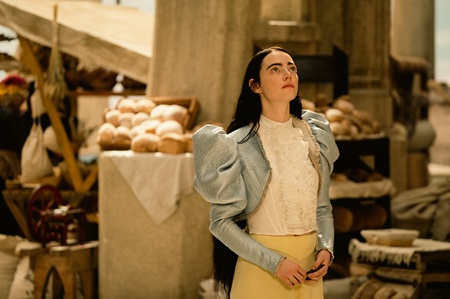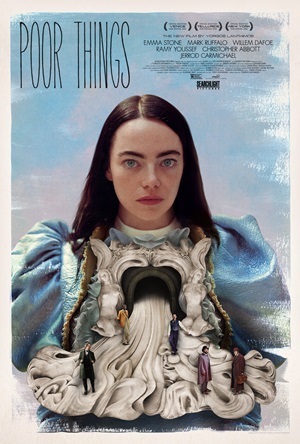
Poor Things Presents a Feminist Frankenstein Ready to Make the World Her Own
Like an absurdist smashing-together of Mary Shelley’s Frankenstein, A Room with a View, The Adventures of Baron Munchausen, and the work of surrealist Spanish artist Salvador Dalí (with a little of the tale of 19th-century grave robbers William Burke and William Hare thrown in for good measure), director Yorgos Lanthimos once again sets storytelling convention on its ear with the delightfully sensationalistic Poor Things. Adapted from the acclaimed novel by the late Scottish author Alasdair Gray, this is a wickedly ambitious journey into self-actualization and human understanding that purposefully challenges the viewer with every idiosyncratic step it takes. It’s also one of 2023’s best films.
While the source material is told from multiple points of view, Lanthimos and screenwriter Tony McNamara — reteaming for a third time after their success with 2018’s The Favourite and the television series The Great — choose to keep things focused on Bella Baxter (Emma Stone). Who she is and where she came from is one of the chief mysteries at this story’s center. While the initial explanation for her presence is fairly straightforward and obvious (I mentioned Shelley’s iconic literary masterwork for a reason), that’s only the tip of the iceberg of this adventurously passionate and enthusiastically questioning young woman.
What does it mean to be human? At what point do we know ourselves well enough to make our own decisions in life outside of the restrictions imposed upon us by our parents? Can we make the world our own? What role does gender play? Wealth? Poverty? Race? Sexuality? Upbringing? Education? How do all of those fit? Do they matter? Should they matter?
These are only a few of the big, broad questions Lanthimos is asking, and it’s not a spoiler to say that he’s unable (and likely unwilling) to definitively answer any of them. But that also isn’t the point. Bella’s evolution is both distinctly feminine yet also gloriously universal in its gender-nonspecific ecstasy. The director keeps the focus on her, as it is her experiences that illustrate all of life’s peculiar possibilities. Bella is a force of nature striving to know the unknowable, and much like Barbie’s Stereotypical Barbie, she will willingly take the good with the bad as she strives to become the person she feels she was meant to be — even if she doesn’t quite know exactly who that is yet.
Assisting Bella as she goes from one adventure to the next are Willem Dafoe (as brilliant scientist Dr. Goodwin Baxter), Ramy Youssef (as eager medical student Max McCandles), and Mark Ruffalo (as lawyer and misanthropic lothario Duncan Wedderburn). Also along for the ride are legendary German superstar Hanna Schygulla, The Tragedy of Macbeth scene-stealer Kathryn Hunter, an almost unrecognizable Margaret Qualley, the dashingly suave Jerrod Carmichael, and an odiously smarmy Christopher Abbott.
By design, Dafoe, Youssef, and especially Ruffalo make the most lasting impression, but every member of the ensemble has an important part to play, and Lanthimos makes certain all of them get their opportunity to shine. There’s a stunning moment involving Carmichael and Stone in which his character introduces Bella to life’s hidden miseries while also revealing just how little the clueless A-list aristocracy cares to know about the underprivileged hoi polloi struggling to survive literally right underneath their very feet. There’s another in which Hunter’s brothel matriarch clues the young woman in on society’s patriarchal imbalances and helps her understand exactly what it would take for any person — let alone Bella — to subvert and conquer them.
But this is Stone’s showcase, and she makes mincemeat out of it. Bella is basically an infant at the start of the film, barely able to do more than babble as she toys with her food at the dinner table. But little by little, she learns and she grows. She begins to long for more. She wants to head out into the world and to put all the pieces together for herself, no matter how extreme the challenges or unknown the dangers of doing so may prove to be.
Stone is extraordinary. She brazenly transverses every obstacle with passionate panache. There is a nakedly raw vitality to her performance that is continually astonishing. Bella’s wide-eyed wonderment pierced my soul. Her rapture, her heartbreak, her happiness, her pain — I felt it all. Stone finds a way to make every emotion leap off the screen with triumphant explosiveness. Bella goes from being a lumberingly monosyllabic experiment to a determinedly self-confident woman in seemingly the blink of a cinematic eye.
Lanthimos does stumble every now and then. Some of his pointedly feminist ruminations still come from a brazenly male point of view, and there is an odd didacticism that barges in from almost out of nowhere during the last act. While the director’s technical proficiency is as stunning as ever — director of photography Robbie Ryan (American Honey), production designers Shona Heath and James Price (The Nest), and costume designer Holly Waddington (Lady Macbeth) deliver on every conceivable level — the outrageously phantasmagoric visuals he’s conceived don’t always cleanly or authentically mesh with the emotional ambiguities he is attempting to explore.
Yet Bella’s liberation in Poor Things is the type of rapturous euphoria we can all learn from. To see her grab life with both hands, refuse to let go, and then ride it unbridled and undeterred for all to see while giving zero cares to what anyone may think? It’s marvelous. She is no monster created in a lab by a gifted mad scientist, meant for ridicule, fear, and derision. This is a woman, nothing more, and certainly nothing less. Sit back, relax, and listen to her roar.
– Review reprinted courtesy of the SGN in Seattle
Film Rating: 3½ (out of 4)







